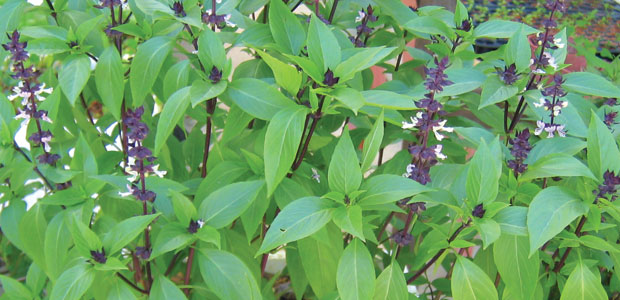Advertisement
Holy Traffic Jam!
Holy basil to the rescue

Your six-year-old dawdled all morning and now you’re stuck in traffic, late for an important meeting. Your heart pumps, your adrenals churn out that stress-induced villain, cortisol, aided by that double-double you’re gulping. The “fight-or-flight” mechanism kicks in. But you can’t fight or fly–you’re stuck in traffic.
We live in stressful times. According to studies at the US National Institutes of Health, approximately 90 percent of all illnesses are caused or aggravated by stress. So what do we do? While exercise and meditation are excellent stress antidotes, neither is an option when the clock reads 8:57 am and you have six more clogged kilometres to navigate.
Enter holy basil (Ocimum sanctum), an ancient Ayurvedic herb, known as Tulsi in Hindi, botanically related to its culinary cousin, sweet basil. In traditional Ayurvedic medicine, this sacramental herb was considered fever reducing, anti-inflammatory, antioxidant, blood purifying, antiparasitic, cough suppressing, diuretic, immune strengthening, digestive aiding, mind and memory enhancing, and nerve calming. But it is holy basil’s ability to lower cortisol and blood sugar levels that has been drawing attention in the West.
Holy basil has found an appreciative new clientele in our stressed-out 21st century due to its ability to reduce cortisol levels and ease stress. The herb appears to work as an adaptogen–in other words, it helps the body adapt to stress in a healthy way.
Russian scientist Dr. Nicholai Lazarev, who coined the term adaptogen, defined it as an agent that allows the body to counter adverse physical, chemical, or biological stressors by raising nonspecific resistance toward such stress, thus enabling the body to adapt to it.
Cortisol and Stress
Cortisol’s connection to stress and illness is confirmed by Emma Adam, Northwestern University assistant professor of education and social policy. She says, “When [cortisol is] activated, you put rest and repair operations on hold to deal with immediate crisis. If you’re always activating the stress systems, and not giving your emotions or your body a break, this constantly or chronically elevated level of [stress] hormones could cause wear and tear that contributes to a variety of stress-related illnesses.”
A 1991 study published in the Indian Journal of Pharmacology compared holy basil favourably to two other well-known adaptogens, Siberian ginseng (Eleutherococcus senticosus) and Asian ginseng (Panax ginseng). The study found that holy basil was the most potent antistress agent of the three herbs and also had the highest margin of safety.
Blood Sugar Levels
Terry Vanderheyden, ND, director of research at St. Francis Herb Farm in Ontario, says, “Although many customers use holy basil for its adaptogenic and stress-reducing properties–not unlike how one would use ginseng–my recent experience with the herb was the resolution of a patient’s long-standing diabetic neuropathy.”
Dr. Terry discovered holy basil for this use after reading a human study showing marked reductions in blood sugar in diabetics given holy basil reported in the International Journal of Clinical Pharmacology and Therapeutics. He also read laboratory research indicating that diabetic animals’ glucose tolerance tests normalized after they were given the herb.
This holy herb shows promise in many areas of research, particularly in the area of stress reduction. So, the next time you’re white-knuckling that steering wheel, forego the coffee and take a deep breath and, perhaps, some holy basil.
Holy Basil in Your Pasta?
You might want to stick with your traditional basil for that pasta recipe. Although not traditionally added to food or used in cooking, holy basil, with its sharp, clove-like flavour, is often used in Thai cooking for hot stir-fries and curries. Its leaves are either green or green with reddish tips.




